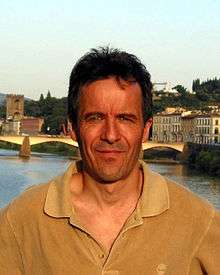Bernard Chazelle
| Bernard Chazelle | |
|---|---|
 | |
| Born |
November 5, 1955 Clamart, France |
| Nationality | French, American |
| Alma mater |
École des mines de Paris Yale University |
| Spouse(s) | Celia Martin Chazelle |
| Children |
Damien Chazelle Anna Chazelle |
| Scientific career | |
| Fields | Computer science |
| Institutions | Princeton University |
| Doctoral advisor | David P. Dobkin |
| Doctoral students | Nadia Heninger |
Bernard Chazelle (born November 5, 1955) is a French-American computer scientist. He is currently the Eugene Higgins Professor of Computer Science at Princeton University. Much of his work is in computational geometry, where he is known for his study of algorithms, such as linear-time triangulation[1] of a simple polygon, as well as major complexity results, such as lower bound techniques based on discrepancy theory.[2] He is also known for his invention of the soft heap data structure and the most asymptotically efficient known algorithm for finding minimum spanning trees.[3]
Early life
Chazelle was born in Clamart, France, the son of Marie-Claire (née Blanc) and Jean Chazelle. He grew up in Paris, France, where he received his bachelor's degree and master's degree in applied mathematics at the École des mines de Paris in 1977. Then, at the age of 21, he attended Yale University in the United States, where he received his PhD in computer science in 1980 under the supervision of David P. Dobkin.
He is the father of director Damien Chazelle, the youngest person in history to win an Academy Award for Best Director, and Anna Chazelle, an entertainer.
Career
He went on to claim important research positions at institutions such as Carnegie Mellon, Brown, NEC, Xerox PARC, the Institute for Advanced Study, and the Paris institutions École normale supérieure, École polytechnique, Inria, and Collège de France. He is a fellow of the ACM, the American Academy of Arts and Sciences, the John Simon Guggenheim Memorial Foundation, and NEC, as well as a member of the European Academy of Sciences. He has also written essays about music and politics.[4]
Works
- The Discrepancy Method: Randomness and Complexity. Cambridge University Press. 2000. ISBN 978-0-521-00357-5.
References
- ↑ Chazelle, Bernard (1991), "Triangulating a Simple Polygon in Linear Time", Discrete & Computational Geometry, 6: 485–524, doi:10.1007/BF02574703, ISSN 0179-5376
- ↑ Chazelle, Bernard (2000), The Discrepancy Method: Randomness and Complexity, Cambridge University Press, ISBN 978-0-521-00357-5
- ↑ Chazelle, Bernard (2000), "A minimum spanning tree algorithm with inverse-Ackermann type complexity", Journal of the Association for Computing Machinery, 47 (6): 1028–47, doi:10.1145/355541.355562, MR 1866456
- ↑ Profile, princeton.edu; accessed February 16, 2017.
External links
| Wikiquote has quotations related to: Bernard Chazelle |
|
| |
|
|